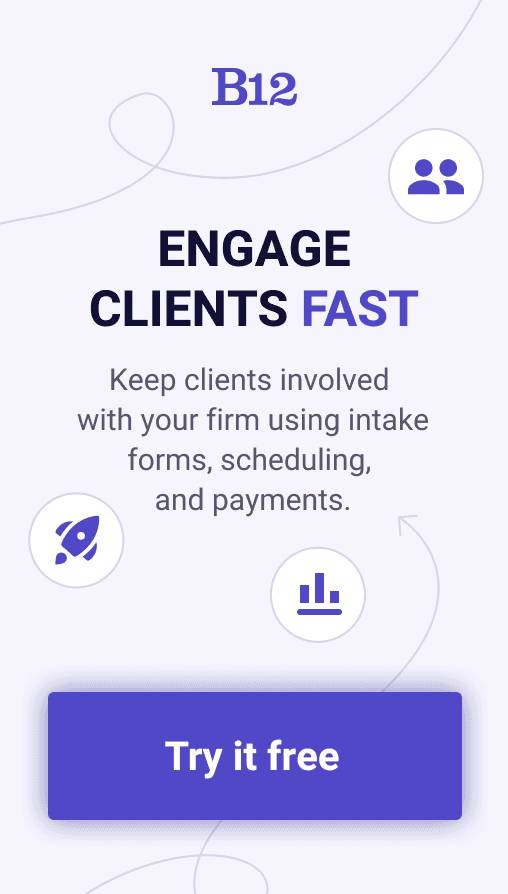Build an AI website in 60 seconds
AI generates your personalized website instantly with built-in scheduling, payments, email marketing, and more.
Start for free
Invoice preparation checklist for business owners

Invoicing is a crucial company function that keeps the cash and operation going. However, creating an invoice checklist can be daunting for many entrepreneurs. To help you work efficiently and avoid mistakes, an invoice checklist ensures invoices are created accurately, sent on time, and paid promptly.
In this article, we'll explore the importance of an invoice checklist for business owners, what information to include, and the steps to implement the checklist effectively. We'll also discuss common mistakes to avoid and accounting and record-keeping requirements to consider. By the end of this post, you'll have enough information to create an effective invoice checklist that streamlines your invoicing process and improves your business's financial management.
Why is an invoice checklist important for business owners?
An invoice checklist is a crucial component of any business that invoices its customers for goods or services. This checklist helps business owners ensure their invoices are complete, accurate, and compliant with accounting and taxation requirements. Without an invoice checklist, errors and omissions can lead to delays in payment, financial penalties, or even legal disputes.
Invoice checklists provide a systematic approach to invoicing that streamlines the process and reduces the likelihood of mistakes. They also help business owners keep track of invoices and ensure they are paid on time. In addition, a good invoice checklist can help establish a standard for invoicing within an organization, ensuring consistency and efficiency.
Basic information to include in an invoice checklist
To guarantee that your invoices are effective and correct, there are several fundamental pieces of information to include in your checklist. First, ensure that your invoice includes all necessary contact information, like your name, mailing address, and phone number. This will clarify to your clients who they should pay and how to contact you if they have any questions.
Another critical detail to include in your invoice is the invoice number. This unique identifier for each invoice helps you and your customers keep track of transactions. Sequential numbering is recommended for this purpose, as it helps maintain a clear and concise record-keeping system. Your invoice should also include a thorough breakdown of the products or services rendered, their amount, price, and related taxes or fees.
Your invoice checklist should also include the payment terms, such as the due date and the acceptable payment methods. This helps the customer understand the payment deadline and minimizes the risk of late payments. You should also specify any late payment fees or interest charges that may apply in case of overdue payments and any discounts or promotions that apply if payments are made within a certain timeframe.
Additionally, set expectations for how you will handle invoice disputes or discrepancies. You should outline a clear process for clients to raise concerns or ask for clarification, and specify how responses will be provided. Your invoice should also remind clients of their right to dispute charges if they are unsatisfied with the services or products.
Including this fundamental information in your invoice checklist ensures that your invoicing process is efficient and precise, freeing up your time to concentrate on other business areas.
Accounting and record-keeping requirements to consider in your invoice checklist
One of the fundamental accounting requirements to consider in your invoice checklist is accurate record-keeping. Detailed records of all invoices, receipts, and expenses can help you maintain financial transparency and provide proof of your financial transactions. This information is essential for tax compliance, audits, and financial reporting.
In addition, it is crucial to understand the different types of taxes that apply to your business and incorporate them into your invoice checklist. This includes sales tax, income tax, and other applicable taxes. A clear understanding of these tax requirements will make it easier for you to create invoices that comply with legal and regulatory standards.
Another aspect of accounting and record-keeping to consider in your invoice checklist is invoicing frequency, payment terms, and deadlines. This includes establishing clear payment terms, reminders for overdue invoices, and protocols for following up with clients who still need to pay their bills. Doing so can maintain a positive cash flow and financially stabilize your business.
Common mistakes to avoid when creating an invoice checklist
When creating an invoice checklist, be mindful of common mistakes to ensure its effectiveness. Some of these mistakes are the following:
Information overload
One common mistake is including too much information on the checklist, which can overwhelm the business owner and detract from its purpose. Include necessary and relevant information to ensure the checklist is easy to understand and follow.
Not up-to-date
Another common mistake when creating an invoice checklist is updating it regularly. A checklist that is not up-to-date can become obsolete, and important tasks may be missed. Business owners must ensure their checklists are updated and aligned with current accounting and record-keeping requirements.
Importance of invoice checklist
Business owners may also need to communicate the importance of the invoice checklist to relevant staff members. All employees must understand the importance of following the checklist and the consequences of failing. This can help ensure that everyone is on board with the process and that there is consistency in the follow-through.
Regular testing
Lastly, business owners may need to regularly test their invoice checklist's effectiveness. By regularly evaluating the checklist and making any necessary changes, it can be improved and continue to meet the needs of the business. Testing the checklist can also help identify any gaps in the process that may not have been noticed initially.
Tips for implementing your invoice checklist and staying on track
To implement your invoice checklist and stay on track, ensure all team members are on the same page. This means that everyone involved in the invoicing process, whether the accounting team or sales team, should be trained on the proper use of the checklist. It also ensures everyone follows the same steps, reducing the risk of errors or gaps in record-keeping.
One tip for implementing your invoice checklist is establishing a regular review and update schedule. Keeping your checklist up-to-date with any changes or additional requirements is important. This will help to ensure that the checklist remains effective and helps to maintain a high level of accuracy in your invoicing process.
Another factor in implementing your invoice checklist is to use technology to your advantage. Several software tools can help automate your invoicing processes, such as cloud-based accounting software or invoice generation tools. These can streamline your invoicing process, reduce errors, and provide easy access to records and data.
Moreover, monitoring and evaluating your invoice checklist's effectiveness is crucial. Keep track of metrics such as invoice accuracy, record-keeping compliance, and overall efficiency in the invoicing process. This can help you identify areas for improvement, refine your checklist, and optimize your invoicing process over time. By following these tips, businesses can effectively implement an invoice checklist and maintain high accuracy and efficiency in invoicing.
The value of an invoice checklist for business owners
As we conclude this post, it is essential to emphasize again the great value of an invoice checklist for business owners. Incorporating an invoice checklist into your business's accounting and the record-keeping process can streamline and simplify your invoicing process, saving you time, money, and frustration. Following the basic information and accounting requirements outlined in this post, you can create an effective invoice checklist tailored to your business's needs and requirements.
Furthermore, focus on avoiding common mistakes when creating and implementing an invoice checklist. Careful consideration must be given not only to the content of the checklist but also to the implementation process. For example, ensuring that your employees are properly trained in using the invoice checklist is crucial to its success. By avoiding common mistakes and following our tips, you can ensure that your invoice checklist is useful in your accounting process.
Also, remember to stay on track with your invoice checklist. Regular review and updates are essential to ensuring that your checklist remains an effective and efficient tool for your business. As your business grows, your invoicing process may also change, so be sure to revisit and adjust your invoice checklist regularly.
In conclusion, an invoice checklist is essential for any business owner looking to improve their accounting and invoicing processes. By incorporating basic information, accounting, and record-keeping requirements and avoiding common mistakes, you can create a useful and effective invoice checklist for your business. Regularly reviewing and updating your checklist will help keep you on track and ensure its success.
Manage your invoices better with B12
Use B12 to establish your small business online and get everything you need to sell services. B12 offers streamlined, built-in invoicing and payments that allow you to easily manage and organize sending invoices and receiving payments. Automate reminder emails to ensure more clients pay on time, so you spend less time manually chasing them down. Get started today for free in 60 seconds.
Attract, win, and serve more clients
Receive helpful resources directly to your inbox to help you succeed online.
Draft your site in 60 seconds
Get an AI website made specifically for you that's free to launch.
Start for free ✨No credit card required
Spend less time on your website and more time growing your business
Let B12 set up your professional online presence with everything you need to attract, win, and serve clients.





